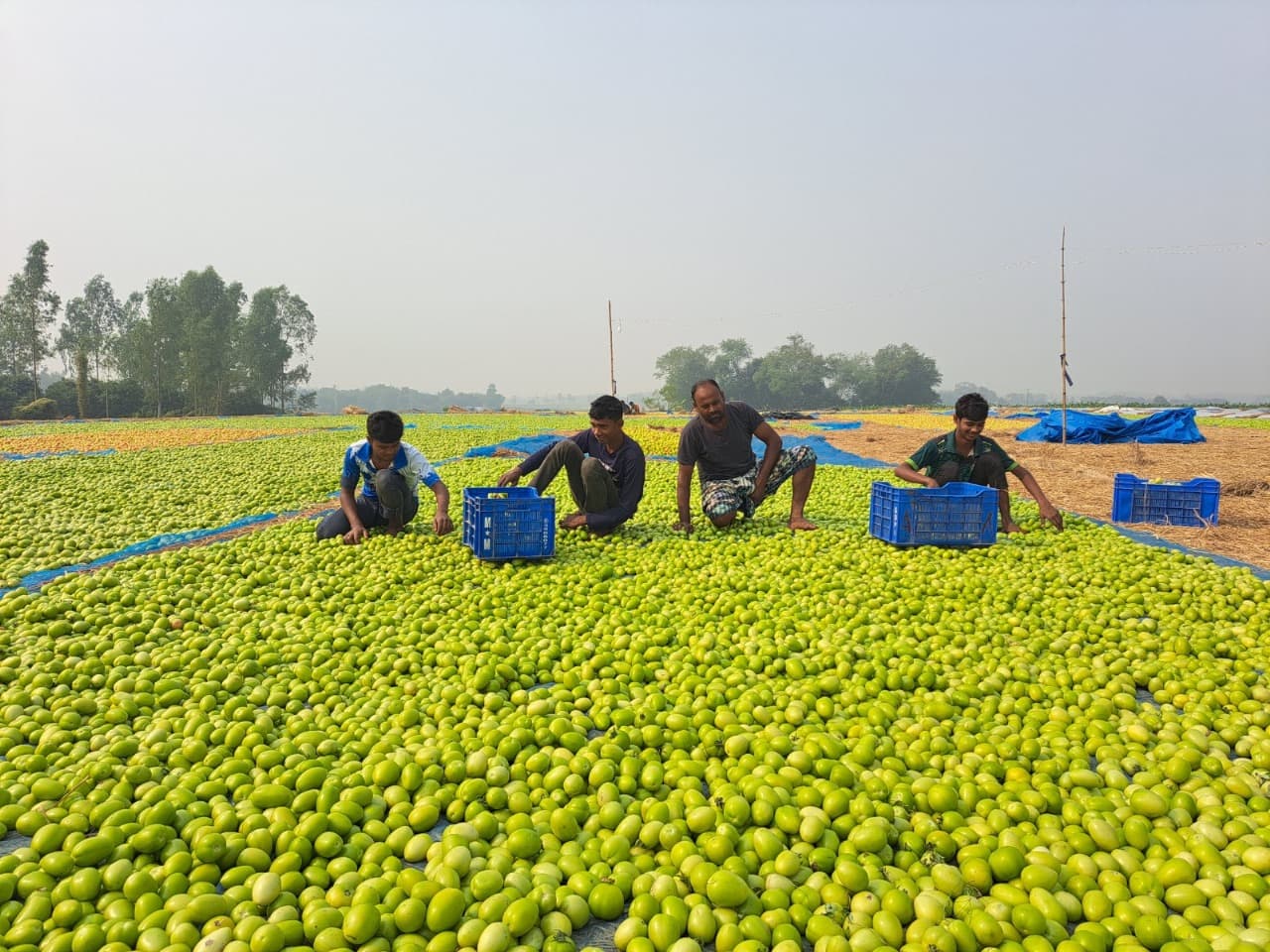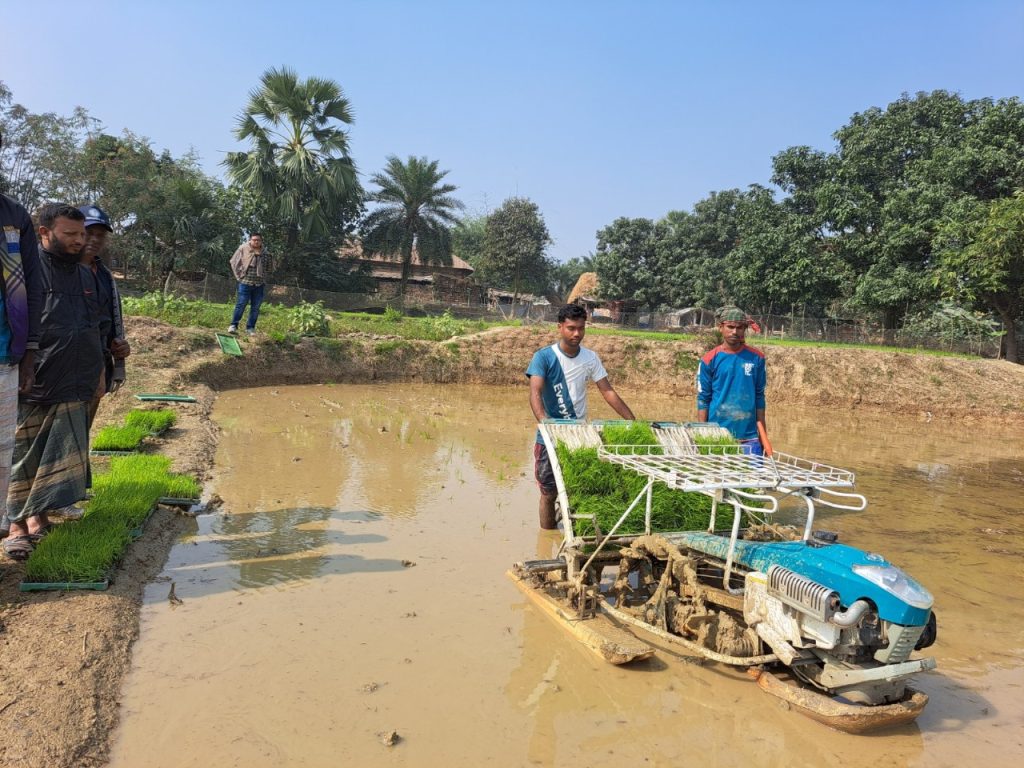Farmers’ Hub: Bringing Benefits Directly to Farmers’ Doorsteps

The Introducing Water Efficient Technologies (IWET) project is implemented by the Sustainable Agriculture Foundation Bangladesh (SAF Bangladesh), coordinated by the 2030 Water Resources Group, and funded by The Coca-Cola Foundation since 2018. The initiative is designed to improve agricultural productivity, climate resilience, and water-use efficiency in the drought-prone Barind Tract of northwestern Bangladesh.
In parallel to delivering resilient water management and productivity boosting technologies to farmers directly, Barind value chain has also been supported by Farmers’ Hubs network.
The IWET project promotes the adoption of climate-resilient and water-efficient agricultural technologies through field demonstrations, capacity building, and institutional linkages that contribute to sustainable rural livelihoods and environmental stewardship.
Development of Farmers’ Hubs as One-Stop Service Platforms for Farmers
IWET has established 75 Farmers’ Hubs, which serve as integrated service centers providing farmers with access to climate-smart technologies, quality inputs, mechanization services, and market linkages. Farmer Hubs are a linchpin for inclusive, climate-smart agricultural transformation. By aggregating demand and supply, providing training and services, and linking farmers to markets and finance, they address the core constraints facing smallholders. Their integrated approach not only accelerates the adoption of climate-smart technologies but also builds resilience, improves livelihoods, and supports broader rural development goals.

The photo shows – Farmers’ Hub owner purchasing tomato in bulk for supplying to Pran Agro Industries (Pran sauce)
Without Farmer Hubs or similar aggregation models, efforts to scale climate-smart agriculture, mechanization, and market access will remain fragmented and less effective. Hubs are thus essential for achieving sustainable, resilient, and inclusive food systems in the face of climate change.
Key Services Offered by Farmers’ Hubs
Promoting Climate-Smart Agriculture (CSA):
- Demonstration & Extension: Stress-tolerant seeds, conservation agriculture, AWD (rice), and drip/sprinkler irrigation (fruits/vegetables)
- Climate Advisory Services: Real-time weather alerts, crop advisories, and early warnings via apps and SMS
- Input Access: Climate-resilient seeds, biofertilizers, vermicompost, and eco-friendly pest control
- Sustainable Intensification: Crop diversification, IPM, and agroforestry advisory for ultra-high-density production systems
Enabling Technology Access:
- Shared Machinery: Rental services (tillers, transplanters, harvesters etc.)
- Training & Support: Machine operation, maintenance, and repair
- Digital Tools: Soil sensors, GPS, and precision farming technologies
Bridging Farmers to Markets:
- Collective Marketing: Aggregated produce for better prices and scale
- Buyer Linkages: Connections to traders, processors, and retailers
- Post-Harvest Services: Grading, packaging, cold storage, and transportation
Creating Equitable, Scalable Impact:
- Youth & Women Empowerment: Entrepreneurship and services targeted at rural women and youth
- Financial Linkages: Access to microfinance, credit, and insurance
- Data & Evidence: Digital tracking of weather, yields, and market performance
Current Contributions of Barind Hubs to Local Agri-Transformation
- Production of climate-smart vegetable seedlings using soilless techniques
- Supply of high-quality saplings (mango, guava, Malta, jujube), timber species, and flowering plants
- Provision of agricultural inputs: certified seeds, fertilizers, organic pesticides, fruit bags, harvesting tools
- Distribution of organic fertilizers to improve soil health and water retention
- Cluster-based mechanization for transplanting, harvesting, weeding, tillage, and spraying
- Establishing forward market linkages with aggregators, processors, corporate buyers, and wholesale markets
- Delivery of advisory services, each hub engaging with 350–500 farmers

Product Supply Summary from Farmers’ Hubs
Mechanization Services Summary (community approach):
| Sl no. | Activities | # of FH | # of Farmers | Area coverage (Acre/ Pieces) | Cost/acre in BDT/ Unit price | Revenue (BDT) | Costing of manually/acre (BDT) | Farmer saving cost/acre (BDT) | Total saving cost of farmer (BDT) |
|---|---|---|---|---|---|---|---|---|---|
| 1 | Mechanical Rice Transplanting | 1 | 21 | 17 | 7,500 | 127,500 | 10,500 | 3,000 | 51,000 |
| 2 | Mechanical Rice Harvesting | 4 | 89 | 115 | 6,000 | 690,000 | 9,000 | 3,000 | 345,000 |
| 3 | Rent from Small Machine | 45 | 1,519 | 1,519 | 100 | 161,650 | 150 | 50 | 75,933 |
| 4 | Mango Fruit Bag | 10 | 62 | 260,000 | 3.5 | 910,000 | |||
| Total | 1,629 | 1,651 | 13,600 | 979,150 | |||||
Mechanization Services Summary (community approach):
| Sl no. | Activities | # of FH | # of Farmers | Area coverage (Acre/Pieces) | Cost/acre in BDT/Unit price | Revenue (BDT) | Costing of manually/acre (BDT) | Farmer saving cost/acre (BDT) | Total saving cost of farmer (BDT) |
|---|---|---|---|---|---|---|---|---|---|
| 1 | Mechanical Rice Transplanting | 1 | 21 | 17 | 7,500 | 127,500 | 10,500 | 3,000 | 51,000 |
| 2 | Mechanical Rice Harvesting | 4 | 89 | 115 | 6,000 | 690,000 | 9,000 | 3,000 | 345,000 |
| 3 | Rent from Small Machine | 45 | 1,519 | 1,519 | 100 | 161,650 | 150 | 50 | 75,933 |
| 4 | Mango Fruit Bag | 10 | 62 | 260,000 | 3.5 | 910,000 | |||
| Total | 46 | 1,629 | 1,651 | 13,600 | 979,150 |

This photo shows the mechanical rice transplanting





























